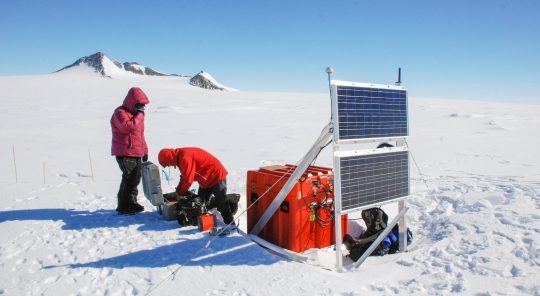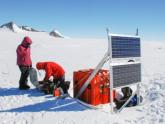By Máximo Gowland (Article published on Nodal).
The sovereignty dispute over the Malvinas, South Georgia and South Sandwich Islands not only represents a confrontation regarding interests, territory, maritime spaces and natural resources - renewable and non-renewable - in the South Atlantic, but also a projection in Antarctica.
Suffice it to recall that Argentina claims sovereignty over the immense region included in the Argentine Antarctic Sector, delimited by the 25° West and 74° West meridians, between the 60° South parallel and the South Pole, which integrates the territory of the Province of Tierra del Fuego, Antarctica and South Atlantic Islands.
The South Atlantic insular territories play a role in the arguments that both Argentina and the United Kingdom put forward to support their territorial claims in Antarctica. Both the United Kingdom and Chile have territorial claims that overlap - the Chilean partially and the British totally - with the Argentine Antarctic Sector.
But the territorial disputes in Antarctica (south of the 60° South parallel) have been framed by a multilateral system created by the Antarctic Treaty (1959). In a scenario of territorial competition in the context of the Cold War, the Antarctic Treaty protected territorial claims and placed science and international cooperation at the center of Antarctic activity in all the countries that are Parties. The Treaty has not only been clearly successful in achieving these goals, but it has also made environmental conservation a fundamental pillar, which is also a priority for our country today. In the 60 years of the Antarctic Treaty, there have been no conflicts in Antarctica, and Antarctic scientific research has contributed significantly in areas of knowledge of global relevance, such as climate change, and it has provided our country with a better understanding of this region.
In the context of the 60th anniversary of the Antarctic Treaty, it is worth recalling the importance of Antarctica for our country. This importance derives from the pioneering role of Argentina in that region since the beginning of the 19th century and from the resulting intense Antarctic activity; due to the geographic contiguity of the South American continental Argentine territory and the consequent proximity of Ushuaia to Antarctica; and due to the intense past and current scientific activity, much of which is carried out in cooperation with more than twenty countries, including those in our region.
International cooperation is not only a mandate of the Antarctic Treaty, but it also constitutes an indispensable instrument to carry out the great amount of scientific activities in a continent where the challenges for science and logistics are notable. For a country like Argentina, which claims sovereignty over Antarctica, international cooperation also allows to highlight its virtuous presence through activities that lead to greater knowledge - and protection, as necessary - of this part of the national territory.
Argentina develops intense cooperation with numerous countries. In some cases it is long-standing and wide, such as Germany with the joint laboratory at the Carlini Base. In others, it is more limited, as is the case with Spain, Italy, France, the United States, Japan or Sweden, even with the United Kingdom itself, to name just a few. But Argentina has also been working steadily to strengthen cooperation with the countries of the Latin American region, which, in addition to being aligned with the provisions of the Antarctic Treaty, constitutes an axis of our National Antarctic Policy.
It is worth mentioning the recent cooperation with Peru, which allowed for two consecutive seasons the development of a research project of the Argentine Antarctic Institute on board the modern oceanographic vessel BAP Carrasco of the Peruvian Navy, to carry out studies and monitoring of krill larvae in the western area of the Antarctic Peninsula, achieving about twenty study scales on each trip. Moreover, cooperation has been provided to the Colombian Antarctic program, facilitating studies on climate change at our Marambio base, training of its naval officers aboard our icebreaker ARA Almirante Irízar, and training in Antarctic diving at our Carlini base. With Uruguay, it can be highlighted the recent training offered by Argentina and Chile by integrating a technician from the Uruguayan Antarctic Institute as an observer in joint inspections carried out with Chile at foreign Antarctic bases last season. As for Brazil, the obtaining of resources from financing organisms for several joint scientific projects has resulted in an increase in bilateral cooperation. This resulted in the participation of Argentine researchers on board the Brazilian ship Maximiano, and in the participation of Brazilian scientists in research groups at the Marambio base. Undoubtedly, based on the possibilities offered by both the brand new Commander Ferraz Brazilian Base, completely rebuilt after its destruction by a fire in 2012, and those of our renovated Almirante Irízar icebreaker, to develop new joint studies, opens a prolific space of interest to strengthen this cooperation with Brazil.
Having said that, cooperation with Chile, which is our natural strategic partner in Antarctica for its presence, its history and its leading role, deserves a special mention. Just looking at the geography of the southern tip of the American Continent and its continuity in the Antarctic Peninsula, we can understand the relevance of maintaining this relationship strengthened, as a way to promote the activities and the knowledge of the region. For this reason, as early as 1947, Argentina and Chile agreed to mutually recognize their sovereign rights over Antarctica (to the exclusion of any other claimant in that area), pending the delimitation of the overlapping territorial portion. Currently, this strategic relationship has been intensified, becoming evident annually with the Combined Antarctic Naval Patrol, the joint inspections of the Antarctic Treaty carried out at foreign bases, the work to monitor growing tourism and environmental management in the Antarctic Peninsula area, the joint research and submission of a joint proposal to establish a Marine Protected Area in the Antarctic Peninsula to the Commission for the Conservation of Antarctic Marine Living Resources (CCAMLR).
Thus, we see that in the framework of the Antarctic Treaty, cooperation with our neighbors is an important tool to consolidate our presence in the entire area of the Antarctic Peninsula. That presence and the deep knowledge of the region, its ecosystems and its resources, as well as the impact of climate change and growing human activities, decisively contributes to Argentina's role in the Antarctic Treaty System and also to a more strategic position regarding the sovereignty dispute in the South Atlantic.
Máximo Gowland: Lawyer and Diplomat. National Director of Antarctic Foreign Policy, Ministry of Foreign Affairs, International Trade and Worship.


